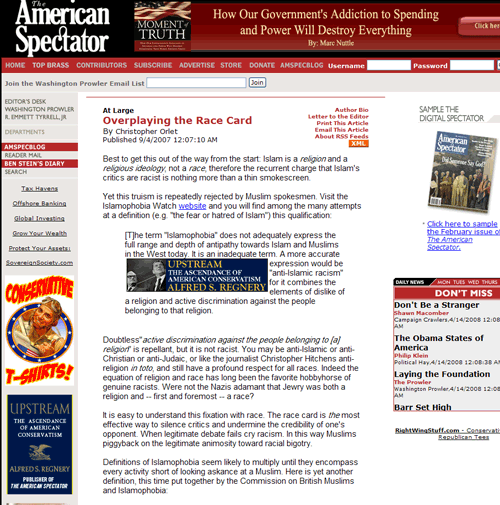Overplaying the Race Card
By Christopher Orlet
Published 9/4/2007 12:07:10 AM
Best to get this out of the way from the start: Islam is a religion and a religious ideology, not a race, therefore the recurrent charge that Islam’s critics are racist is nothing more than a thin smokescreen.
Yet this truism is repeatedly rejected by Muslim spokesmen. Visit the Islamophobia Watch website and you will find among the many attempts at a definition (e.g. “the fear or hatred of Islam”) this qualification:
[T]he term “Islamophobia” does not adequately express the full range and depth of antipathy towards Islam and Muslims in the West today. It is an inadequate term. A more accurate expression would be “anti-Islamic racism” for it combines the elements of dislike of a religion and active discrimination against the people belonging to that religion.
Doubtless”active discrimination against the people belonging to [a] religion” is repellant, but it is not racist. You may be anti-Islamic or anti-Christian or anti-Judaic, or like the journalist Christopher Hitchens anti-religion in toto, and still have a profound respect for all races. Indeed the equation of religion and race has long been the favorite hobbyhorse of genuine racists. Were not the Nazis adamant that Jewry was both a religion and — first and foremost — a race?
It is easy to understand this fixation with race. The race card is the most effective way to silence critics and undermine the credibility of one’s opponent. When legitimate debate fails cry racism. In this way Muslims piggyback on the legitimate animosity toward racial bigotry.
Definitions of Islamophobia seem likely to multiply until they encompass every activity short of looking askance at a Muslim. Here is yet another definition, this time put together by the Commission on British Muslims and Islamophobia:
- Islam is seen as a monolithic bloc, static and unresponsive to change.
- Islam is seen as separate and ‘other’. It does not have values in common with other cultures, is not affected by them and does not influence them.
- Islam is seen as inferior to the West. It is seen as barbaric, irrational, primitive and sexist.
- Islam is seen as violent, aggressive, threatening, supportive of terrorism and engaged in a ‘clash of civilisations’.
- Islam is seen as a political ideology and is used for political or military advantage.
- Criticisms made of the West by Islam are rejected out of hand.
- Hostility towards Islam is used to justify discriminatory practices towards Muslims and exclusion of Muslims from mainstream society.
- Anti-Muslim hostility is seen as natural or normal.
Clearly none of these accusations are racist — indeed, no particular races are mentioned — and most are either antithetical (“Hostility toward Islam is used to justify discriminatory practices toward Muslims”) or self-evidently true, e.g., the charge that Islam is a political ideology and is used for political or military advantage. The commissioners for some reason deny this, apparently unaware that Islam’s founder was an eminent military and political leader. Similarly the suggestion that Islam is not a monolithic bloc was refuted during the Danish cartoon kerfuffle when Muslims from all nations and sects came together as one to denounce the publication of editorial cartoons depicting Le Prophete Mahomet.
Another of the preceding sub-definitions (e.g., that “Islam is seen as inferior to the West”) stupidly contrasts a specific religion with a geopolitical, historical and cultural entity. Perhaps the commissioners meant to say that the Middle East is seen as inferior to the West, or Islam is seen as inferior to Christianity or secularism? Whatever the Commission on British Muslims and Islamophobia meant it was unable to articulate it, which is not surprising considering its finished product. As for Islam being a barbaric, irrational, primitive and sexist religion, what else would one call the traditions of forced marriage, the stoning of gays, genital mutilation, the murder of apostates, etc., etc.?
THE CHARGE OF Islamophobia invariably sends the government and police into a panic. This summer the Islamic Human Rights Commission accused British TV network Channel 4 with “Islamophobia” and stirring up racial hatred after it broadcast a documentary titled Undercover Mosque. In the film an investigative journalist secretly recorded the strange goings on at the Green Lane mosque in Birmingham, England, including fanatical imams condemning democracy, opposing integration, and praising the Taliban for killing coalition troops.
In one of history’s great ironies, the local police and the Crown Prosecution Service first considered charging the radical imams portrayed in the film with criminal incitement. But after concluding that no crime had been committed, the government decided to charge the investigative journalists instead. Real life does not get any more surreal than this.
Government officials claimed the documentary “distorted” the truth, employed “selective quoting,” and used words and phrases “out of context.” It is unclear how the filmmakers misrepresented Dr. Ijaz Mian’s statement that “You cannot accept the rule of the kaffir [derogatory term for non-Muslim]. We have to rule ourselves and we have to rule the other.” Or Abu Usamah’s remark that “We hate the Kaffir! Whether those kaffir are from the UK or the US!” But then as Andrew Anthony speculated in the Observer, perhaps Messrs Mian and Usamah were innocently rehearsing for a stage play.
Maryam Namazie, spokesperson of the Council of ex-Muslims of Britain, has argued that the UK media has been too soft in its coverage of Islam. The political Islamist movement in Britain and Europe, she says, has engineered a “victim status,” whereby criticism of Islam is being equated to racism against Muslims. “Criticizing a belief is not racism, it is not the case that Muslims are being vilified.” Meanwhile the attitude in Britain, according to Channel 4’s Kevin Sutcliffe, has degraded into one of “if you don’t like the message shoot the messenger.”
The upshot is that if you offend the Muslim community, you will suffer for it — if not via death threats, then by lawsuits, fines or the loss of a broadcasting license. In this atmosphere it would seem prudent to simply keep your mouth shut. Happily a few journalists are still willing to risk threats, criminal prosecution and their careers to discover the truth.


